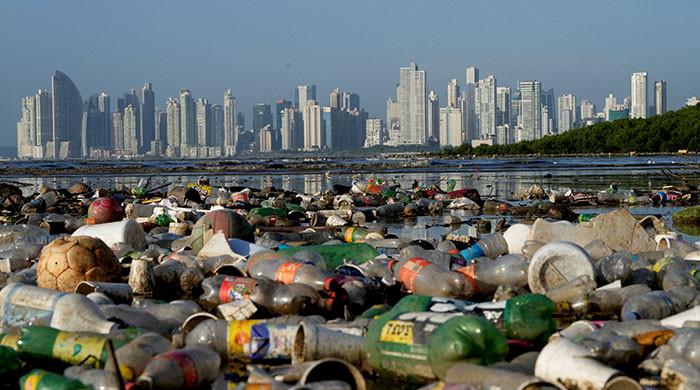Plastic Pollution Treaty Talks End Without Consensus in Geneva
GENEVA: Discussions aimed at creating the world’s first legally binding agreement to combat plastic pollution concluded without a consensus, leaving diplomats expressing dismay that the 10-day negotiations failed to produce a resolution.
Participants had hoped for a breakthrough in the stalled United Nations talks held in Geneva. However, nations advocating for a robust treaty conveyed that the latest version of the text, released overnight, did not align with their ambitions.
Luis Vayas Valdivieso, the chair of the negotiations from Ecuador, adjourned the session, promising to resume discussions at a later, unspecified date. This announcement received subdued applause from weary delegates who had been working until the early hours.
French Ecology Minister Agnes Pannier-Runacher voiced her frustration during the closing session, stating she was “enraged because despite genuine efforts by many, and real progress in discussions, no tangible results have been obtained”.
Colombia’s delegate, Haendel Rodriguez, alluded to oil-producing nations, claiming that an accord had been “blocked by a small number of states who simply did not want an agreement”.
Earlier in the month, diplomats and environmental advocates cautioned that efforts by the European Union and small island nations to restrict the production of virgin plastic – derived from petroleum, coal, and gas – were facing resistance from petrochemical-producing countries and the United States.
John Thompson, the US delegate from the State Department, chose not to comment as he departed the talks.
The future direction of the negotiations remains unclear.
While UN officials and certain countries, including Britain, advocated for the resumption of negotiations, others characterized the process as broken.
The South African delegate remarked, “It is very clear that the current process will not work.”
Over 1,000 delegates convened in Geneva for the sixth round of discussions, following a meeting of the Intergovernmental Negotiating Committee (INC) in South Korea late last year that also concluded without an agreement.
Negotiations extended into overtime as nations attempted to bridge significant divides concerning the scope of future restrictions. Numerous individuals, including Danish Environment Minister Magnus Heunicke, who represented the EU, expressed disappointment that the final push yielded no outcomes.
He told reporters, “Of course, we cannot hide that it is tragic and deeply disappointing to see some countries trying to block an agreement,” while committing to continue working on the treaty necessary to address “one of the biggest pollution problems we have on earth”.
Inger Andersen, the Executive Director of the UN Environment Programme, also pledged continued efforts, stating, “We did not get where we want but people want a deal.”
The most contentious issues encompass production limits, the management of plastic products and hazardous chemicals, and financial aid to assist developing countries in implementing the treaty.
Anti-plastics campaigners voiced their discontent with the outcome but welcomed the rejection of a diluted agreement that failed to impose limits on plastics production. Ana Rocha, the Global Plastics Policy Director from the environmental group GAIA, asserted, “No treaty is better than a bad treaty.”



Comments (0)
No comments yet. Be the first to comment!
Leave a Comment